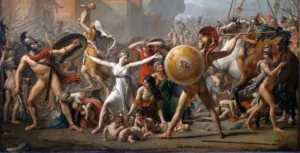Some people did not like my recent piece on Ilhan Omar’s run-in with the State of Israel, in which I argue that American liberals and conservatives should stop projecting themselves onto the Islamic world. We would be wiser, I wrote, to admit that our two cultures are different and work toward a posture of mutual respect:
Islam is not Christianity; the Middle East is not the West. We share some things, yes, but there is no obvious reason why we should want to be the same. There is, in fact, a strong argument that pretended similarities will only frustrate real coexistence. Christians who believe in the Hebraic God—a deity who limits his own will out of respect for the will of man and the desire for a love that is uncoerced, voluntary, and true—should understand that the potential for genuine disagreement is a necessary condition for real relationship.
The reactions to my article were mostly positive, but some readers disagreed with the way I classified Judaism and Christianity in a category separate from Islam. Palestinian Christian lawyer and human rights activist Jonathan Kuttab, who happens to be a friend, wrote, “[Mr. Nicholson’s] message…is totally undermined by his positing a joint ‘Judeo-Christian’ system of values and world view, and specifically excluding Moslems and Islam from it.”
This only perpetuates the “Otherness” and lack of respect Nicholson is trying to challenge… To posit a binary worldview that embraces Judaism and Christianity in a duality that firmly excludes Moslems and Islam is precisely what leads to the disrespect and failed policies that Mr. Nicholson complains about.
It is a fair point that deserves a response.
***
Kuttab is correct that Judaism, Christianity, and Islam bear a family resemblance in their reverence for Abraham and their commitment to monotheism. They also boast other similarities—Jews and Muslims have similar views on law and ritual, Muslims and Christians both proselytize to expand universal faith communities—and no doubt these parallels present interesting opportunities for dialogue between and among the three faiths.
But parallels do not make a patrimony. The Abrahamic discourse is an attractive paradigm for coexistence, but this relatively new and complex category passes over key differences that need to be acknowledged for the purposes of American engagement with the Islamic world. My focus here is not the promise of interfaith dialogue but the basis of national self-understanding.
The argument is simple: Islam is not Hebraic because it makes no place for the Hebrew Bible. The three religions also lack a common discourse because they do not share a common text. The degree to which America was inspired by Hebraic sources is directly proportional to America’s cultural disconnect from the Islamic world.
They also lack a common ancestry. Islam is not “Jewish” in the same sense that Judaism and Christianity are. The latter two religions were formed by the thoughts and experiences—not to mention actual pens—of ethnic Jews who lived in and around the Jewish homeland. Islam, though it drew upon Jewish themes, lacked that genealogical and geographical connection. It was the product of an Arab culture that developed in Arabia, and proudly so.
The Abrahamic link is structural; the Hebraic link is substantive. Islam maintains the idea of one God, a chosen people, and a last judgment, but the content of those ideas is singular because it derives from other sources. Nothing illustrates this better than the story of Abraham himself. Following the Book of Genesis, Jews and Christians believe that Abraham almost sacrificed his son Isaac on Mount Moriah in the land of Canaan. Muslims believe that the son was Ishmael and the location was in the Hejaz. The mismatch between two versions of an old story may seem trivial, but not to the billions of people who see it as foundational to their identity.
Religious texts are not as important as you think, someone interjects. And that is where I disagree. Religious texts are immensely influential in the social and political life of a culture as the source of its cosmological, theological, and anthropological assumptions. Such texts contain our ideas, stories, and myths. They give us the phrases and parables we use to navigate the momentous events of our lives. They portray our heroes and villains, our hopes and dreams. They inspire our novels, plays, and films. Their physical form occupies our bookshelves and nightstands. Archaeologists excavating our ruins ten centuries from now will notice the ubiquity of these books and surmise, correctly, that they were important in the life of our civilization.
They might also conclude that these texts influenced the way we engaged the world beyond our borders. I would agree—and that is my main point.
***
Islam is not Hebraic. What seems like a polemical claim is really just a neat summary of the choices early Christians and Muslims made.
In the second century AD, a cosmopolitan savant named Marcion of Sinope claimed that Jesus and the New Covenant superseded the tribal deity and harsh scriptures of the narrow-minded Israelites. In discarding the Hebrew Bible, Marcion fired the opening salvo in the church’s first civil war. According to the Catholic Encyclopedia, “He wanted a Christianity untrammeled and undefiled by association with Judaism. Christianity was the New Covenant pure and simple… [T]he Old Testament was a scandal to the faithful and a stumbling-block to the refined and intellectual gentiles by its crudity and cruelty, and the Old Testament had to be set aside.”
Marcion’s insurrection failed thanks to church fathers like Justin Martyr, Irenaeus, and Tertullian who immediately fired back. The Christian Bible must include the Hebrew Bible, they argued, or be otherwise incomprehensible. The New Testament did not cancel the Old, but instead incorporated and continued it. Although the fathers had no trouble with the church superseding the Jewish people, none of them believed that Christian scriptures superseded Jewish texts.
The Marcionite controversy could have easily gone the other way. By keeping the Hebrew Bible, the church fathers left a permanent tension at the heart of the new faith. How does the New Testament relate to the Old? What is Christ’s connection to what came before him? Where do the Jewish people fit in God’s cosmic plan? To the frequent vexation of Jews living in the lands of Christendom, answering these tough questions has remained one of the main preoccupations of Christian thinkers well into the present.
But the “Jewish Question” that haunted Christendom did not trouble the lands of Islam, for the followers of Muhammad took a different path. Proclaiming a new revelation at the hand of a new prophet, Islam rejected earlier scriptures as corrupt and irrelevant. While the Quran paraphrased some stories from the Old and New Testaments (in a form mostly unrecognizable to Jews and Christians), its abrogation of the past was intentional and explicit. Christianity kept the Jewish canon and rejected the Jewish people; Islam rejected both. “Fight against those to whom the Scriptures were given, who believe not in Allah nor in the Last Day, who forbid not what Allah and his prophet have forbidden, and follow not the true faith, until they pay the tribute out of hand and are humbled” (Quran 9:29).
While there are hints in the Quran that the “people of the book” are not totally disconnected from truth (16:43, 21:7), there are other indications that Jews and Christians are obstacles to be overcome. “O you who believe! Take not the Jews and the Christians as friends. They are friends to one another. Whoever of you befriends them is one of them. Allah does not guide the people who do evil” (5:51). Many Muslims interpret such passages in a way that dulls their obvious edge, and of course many Jews and Christians do not see each other as friends at all. But normative Islam in its earliest stages still recognized a shared Jewish-Christian error that needed to be eclipsed in the name of right doctrine.
Jews and Christians obviously do not share a complete literary canon, each having adopted additional texts (the Oral Law for the former, the New Testament for the latter) that introduce significant new concepts and make Judaism and Christianity distinct religions. But these texts only make sense as companions to, or derivations from, the Hebrew Bible. While they disagree on what the Hebrew Bible means, Jews and Christians can debate it precisely because they accept its revealed character as foundational.
At the end of the day, to talk about the Hebraic tradition is merely to point out the cultural heritage shared by individuals and societies that revere the biblical texts: the cognate references, the narrative motifs, the imaginative space. It is to recognize that Abraham Lincoln, Frederick Douglas, and Martin Luther King Jr. invoked the Hebrew Bible to express some of their deepest thoughts. To point out that Muhammad Abduh, Sayyid Qutb, and Malcolm X invoked the Quran is not to perpetuate otherness, but to acknowledge that smart people and advanced societies disagree about ultimate truths.
We can respect those disagreements, or we can ignore them. I choose respect.
***
Why does any of this matter to US foreign policy?
First, Americans need to respect the Islamic world as something independent that cannot be controlled by Western systems of thought and governance. One need only glance at the writings of Islamic and post-Islamic (i.e., Arab nationalist) thinkers from the past century to find a constant “Othering of the Occident” and general distaste for Western mores, which are seen as alien intrusions on native societies. Neoconservatives and liberal internationalists who miss this point will keep trying—and failing—to impose post-Christian culture on people who do not want it. Smarter policy will be humbler policy, seeking new approaches based on respect across difference.
Second, Americans who want to defend their values and interests need to first understand those values and where they come from. As I wrote in my piece, “A country that is confused about its own culture cannot effectively engage cultures beyond.” The root problem is disconnection from the origins of our moral order. “It’s not unreasonable,” I wrote somewhere else, “to think that our struggles in the Middle East have as much to do with rising Islamic identity over there as they do with collapsing Christian identity over here.” Cultural insecurity is a major impediment to engagement with the Islamic world, and our frustration with others’ religious attachments will persist as long as we remain ignorant of our own.
Third, Americans need to recognize the exceptional place of the Jewish people in the American story both at home and abroad. Never in my lifetime has anti-Semitism been so prevalent or expressions of kinship with Israel so contentious. Only in an era of total alienation could Americans find the term “Judeo-Christian” strange as applied to their culture. Regardless of our political or religious affiliations, we have all inherited a biblically informed “Hebrew republic” where the existence of the Jewish people is unavoidably bound up with our social and political self-understanding. Recognition of that heritage is not an affront to Muslims any more than to Hindus or Buddhists, and it should in no way impinge on the right of religious freedom enjoyed by all.
To assert that Jews and Christians share a unique bond is not to diminish the value of other religions; it is not to say that the Hebraic tradition is monolithic or written in the heavens; it is not to allege that Israelis are more important than Palestinians, or that Palestinians do not deserve a prosperous and well-functioning state (they do); it is not to deny the usefulness of the Abrahamic paradigm in the interfaith context; it is not to claim that Muslims are impervious to alliance and friendship; it is certainly not to say that Muslims have no place in America or that Jews and Christians should circle the wagons against the world. Claiming one’s roots in the Hebraic tradition—or the Islamic tradition, for that matter—is no more a pretext for xenophobia and violence than showing one’s birth certificate to the next-door neighbor.
The subtext of Kuttab’s comments is that the Middle East and the West should seek a dialogue of cultures rather than a clash of civilizations, and he is of course right. Where we disagree is how that dialogue should start: he thinks that we should recognize a common tradition; I think we should recognize our differences.
My experience is that the best dialogue takes place when two sides admit their disagreements and commit to respecting each other anyway.







 Live in the DC area? Sign-up for Providence's in-person events list!
Live in the DC area? Sign-up for Providence's in-person events list!